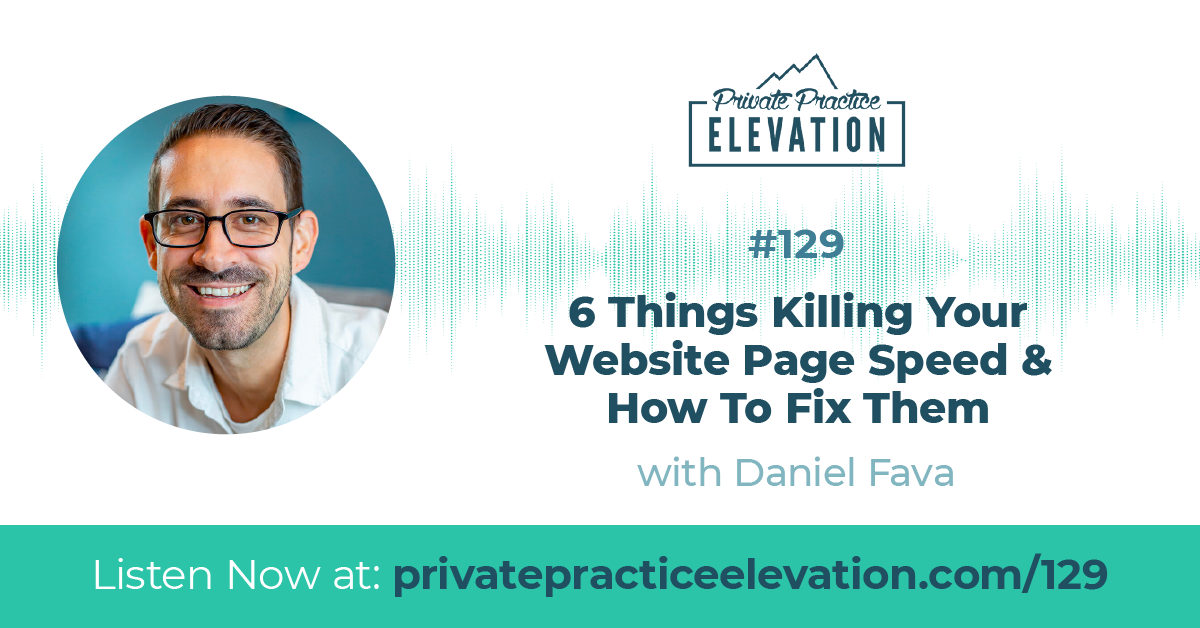In this episode, you’re going to learn 6 things that may be killing your website’s page speed and how to fix them.
The goal of your private practice website is to reach your ideal clients and get them the information they need to (hopefully) choose to work with you for therapy.
But when your website isn’t performing well and provides those potential clients with a slow and frustrating experience, chances are they will leave your website without taking the next step.
And Google has also let us know that page speed is one of the top ranking factors for websites.
So if your website is slow, it could mean an impact on your SEO and a loss in organic traffic from search engines.
How can you tell whether your website loads slowly (aside from just looking at it) and what the main issues are that are impacting your page speed?
Let’s discuss 6 things that may slow your website down and how to fix them.
In This Episode, You’ll Learn:
- How to test your website page speed and the tools you can use
- The importance of choosing a quality hosting provider
- How to optimize images and WordPress plugins
- Recommendations for hosting and WordPress themes
This Episode Is Brought To You By
Subscribe & Review in Apple Podcasts
If you’re not yet subscribed to the podcast I want to encourage you to do that today. This is the best way to make sure you don’t miss an episode! Click here to subscribe on iTunes.
And if you’re feeling extra generous, I’d love to hear what you think about the podcast. Reviews help others find the podcast plus I’d really love to hear what you think! Click here to leave a review. Just click on “Ratings & Reviews” then “Write a review.” Let me know what you like best about the podcast. Thank you!
Links mentioned in this episode:
- Flywheel Managed WordPress hosting (affiliate link)
- Google PageSpeed Insights – speed testing
- Website Planet’s Image Compressor tool
- Divi WordPress Theme (affiliate link)
- Elementor WordPress Theme (affiliate link)
- Get an SEO Assessment of your Website
Key Takeaways: 6 Things Killing Your Website Page Speed & How To Fix Them
Page Speed Impacts your Google Ranking
Having a fast website is important for many reasons, and optimizing it for SEO is one of them.
SEO, or search engine optimization, is the process of improving a website’s visibility in search engine results. This is done by making sure the website is optimized for the specific keywords that people are likely to search for.
People want to find what they’re looking for quickly, and a slow website can deter them from staying on the page. As Daniel Fava, the host of the Private Practice Elevation Podcast, says, “In today’s day and age, people like things fast, we like things loading quick, we want to get to the information that we’re searching for as quickly as possible.”
Google also takes page speed into consideration when ranking websites. If a website takes longer than three seconds to load, it can lose up to 32% of its page visitors.
This can significantly affect the website’s ranking, making it difficult for potential customers to find. Google’s Page Speed Insights tool can be used to check a website’s loading speed and determine if it needs to be optimized.
At Private Practice Elevation, they offer WordPress website care plans where they look after your website and make sure it’s running smoothly. Their Trekker care plan includes speed optimization, where they will make sure your website is running as quickly as possible. This is an important service for those who want to make sure their website is running optimally and that their SEO is as good as it can be.
In conclusion, optimizing a website for SEO is important for those who want their website to be visible in search engine results. Google takes page speed into consideration when ranking websites, so it’s important to make sure your website is loading quickly.
Choose quality hosting services.
One of the most important ways to improve your page speed is to choose quality hosting services.
When it comes to web hosting, it’s important to choose a plan that is suited to the complexity of your website. If you have a complex website, you may need to invest in a more expensive hosting plan. There are hundreds of web hosting plans to choose from, so it’s important to do your research and choose the one that best fits your needs.
It’s also important to consider managed WordPress hosting if you’re using WordPress. Managed WordPress hosting is more secure and can help improve your website’s page speed. It also comes with additional features such as automatic backups and updates, which can help save you time and money.
Finally, it’s important to consider customer service when choosing a hosting provider. Good customer service is essential if you ever encounter any issues with your website. Make sure to read reviews and ask questions before committing to a hosting provider.
Overall, choosing quality hosting services is an important step in optimizing a website for page speed. Investing in a good hosting plan can save you time, money, and frustration in the long run. Make sure to do your research and choose a hosting provider that meets your needs.
Optimize Images and Files
Additionally, optimizing images is a must for any website.
Having high-quality images can attract more viewers, but unoptimized images can drastically slow down page speed. To avoid this, it’s important to use JPEG files instead of other formats, compress images to make them smaller, and avoid images that are one megabyte or larger.
There are several tools available online that can help you compress images without sacrificing quality.
Thirdly, too many plugins can also slow down page speed. Plugins are useful for adding functionality to a website, but they can also add hefty files that slow down loading time. It’s important to only use the essential plugins necessary for your site, and to keep them up to date.
Fourth, compressing files is also essential for page speed. Compressing files such as PDFs, intake forms, eBooks, etc. can reduce their size and make them download faster. Gzip and deflate are the most common types of file compression, and it’s best to reach out to an expert if you need help with this.
Finally, render-blocking resources can also affect page speed. Websites, including WordPress themes, come with code such as JavaScript and CSS files. These files tell a browser how your website is supposed to look, and most browsers prevent sites from loading until the site’s CSS files load.
To avoid this, it’s important to optimize your code and reduce render-blocking resources.
In conclusion, optimizing images and files is essential for improving page speed. Investing in quality hosting services, compressing images and files, using only essential plugins, and reducing render-blocking resources are all important steps for optimizing a website for page speed.
Taking the time to optimize your website can save you time, money, and frustration in the long run.
Optimizing WordPress Websites
WordPress is one of the most popular content management systems available, and for good reason. It’s easy to use and has a wide range of features and customization options. However, if not properly optimized, WordPress websites can be slow and difficult to use. Fortunately, there are several steps you can take to optimize WordPress websites and improve page speed.
The first step is to invest in quality hosting services. A good hosting service will ensure that your website is always up and running, and that it is secure and reliable. It will also provide you with the resources you need to optimize your website for page speed.
The second step is to optimize images and files. Images and files are often the largest contributors to slow page speed. Compressing images and files can significantly reduce their size and improve page speed.
Additionally, it’s important to use only essential plugins. Too many plugins can slow down your website, so it’s important to only use the plugins that are necessary for your website’s functionality.
The third step is to reduce render-blocking resources. Render-blocking resources are JavaScript and CSS files that prevent your page from loading until they have loaded.
To reduce render-blocking resources, you can alter the CSS code to identify conditional CSS elements using the media attribute, use code purging tools to remove unnecessary CSS from your site, bundle JavaScript and CSS files together, and minify the rendering files.
The fourth step is to avoid poorly coded themes. Your website’s theme is the foundation of your website and controls the architecture of your whole site. Using a poorly coded theme can slow down your website, so it’s important to invest in a premium theme that is up to industry best practices.
Taking the time to optimize your WordPress website can make a huge difference in page speed. It can also improve the overall user experience and make your website more secure and reliable.
By following the steps outlined above, you can ensure that your WordPress website is optimized for page speed and is running at its best.


